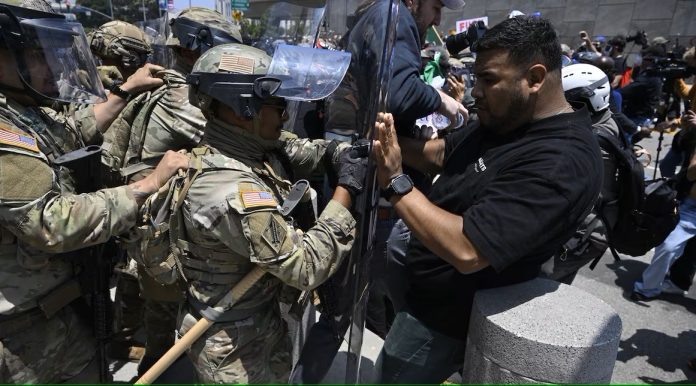he Ninth Circuit Court of Appeals suspends a federal judge’s decision halting the militarization of the streets of Los Angeles, in a new chapter of the ongoing conflict between the president and California Governor Gavin Newsom.
Soldecanarias.net / Redacciòn
The judicial tug-of-war between Donald Trump and the state of California took a new turn after the Ninth Circuit Court of Appeals issued an emergency ruling suspending a decision by a federal judge that had ordered the return of California’s National Guard to its usual control. This legal confrontation takes place amid the militarization of the streets of Los Angeles, where the federal government deployed 4,000 National Guardsmen and 700 Marines to assist with immigration raids and protest surveillance.
The legal battle intensified when Judge Charles Breyer, a District Court judge in California, ruled in favor of Governor Gavin Newsom, arguing that the militarization of the streets of Los Angeles violated the U.S. Constitution, as there had been no formal request from the state government for the deployment of troops. However, the Trump administration immediately appealed the decision to the Ninth Circuit, a court historically more favorable to the president, especially given that Trump had nominated two of the three judges currently on the panel.
Trump vs. Newsom: A Growing Conflict
The clash between Trump and Newsom continues to escalate. The president has maintained a firm stance on militarizing cities to address what he sees as public order problems, while the Governor of California has strongly criticized this intervention, arguing that the U.S. Constitution does not allow the federal government to act without the explicit request of a governor.
California’s Attorney General, Rob Bonta, accused the Trump administration of violating the Posse Comitatus Act, which limits the use of military forces for law enforcement tasks within U.S. territory. Bonta argued that while the Constitution grants certain powers to the president in cases of national emergency, there is no justification for the deployment of troops without the approval of the affected states. In their lawsuit, California sought the immediate revocation of the order that mobilized the military and the restoration of state control over the National Guard.
Protests and Tensions in Los Angeles Streets
The militarization of Los Angeles has been accompanied by protests in the city, particularly against the immigration raids led by the Immigration and Customs Enforcement (ICE) agency. Karen Bass, the Mayor of Los Angeles, declared a curfew in parts of downtown to quell protests and reduce the vandalism that followed the demonstrations.
The use of federal troops for surveillance and crowd control has sparked growing social unrest. Many Californians see this military deployment as an invasion of state sovereignty and a form of repression of social movements. The troops are mainly stationed in key areas of the city, such as the Los Angeles International Airport and federal buildings, but tensions remain high as the case progresses through the courts.
A Long Judicial Road Ahead
The future of this legal dispute remains uncertain. Although Judge Breyer ruled in favor of Newsom on Thursday, the case is now in the hands of the Ninth Circuit Court of Appeals, which will have to decide whether to uphold or overturn the suspension of the judicial decision. The appeal hearing is scheduled for next Tuesday, June 17, 2025.
While California officials celebrated the district court’s ruling, the Trump Administration continues to defend its actions, arguing that the use of troops is backed by discretionary emergency powers the president holds, which do not require state approval for military deployments on their territory. The administration maintains that failing to grant them authority in this case would set a dangerous and unprecedented precedent.
Political and Social Impact
This conflict has implications not only for the legal system but also for political and social dynamics in the United States. The dispute between Trump and Newsom reflects growing divisions over the role of the federal government in public safety issues, especially amid social unrest and racial tensions. The militarization of the streets has also highlighted differences in the interpretation of the Constitution and the scope of presidential powers.
Meanwhile, the Trump Administration continues to face political opposition in California, which views this military deployment as a violation of civil rights and an excessive concentration of power in the federal executive. Governor Newsom remains firm in his position that California has the constitutional right to manage its law enforcement agencies and has vowed to continue fighting legally until the state’s sovereignty is respected.
In the coming days, the Ninth Circuit’s decision is expected to be a crucial milestone in this legal and political battle, which could have repercussions not only for California but also for the future of federal policies across the country.



